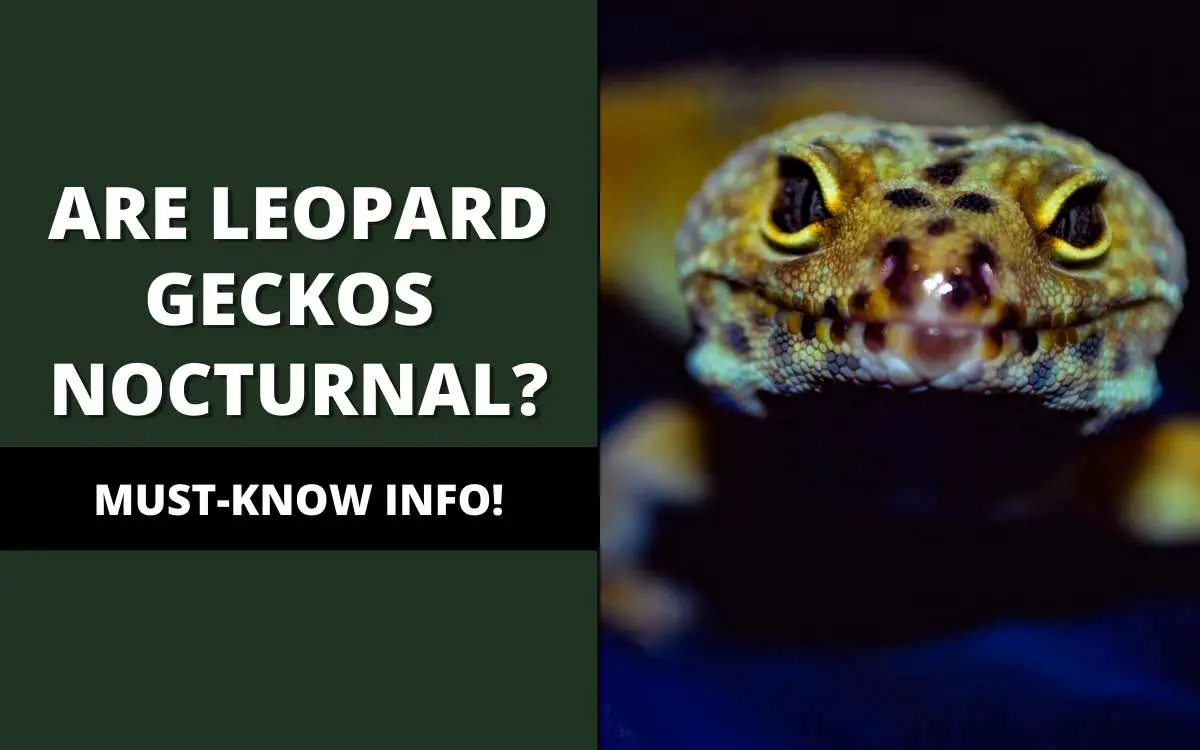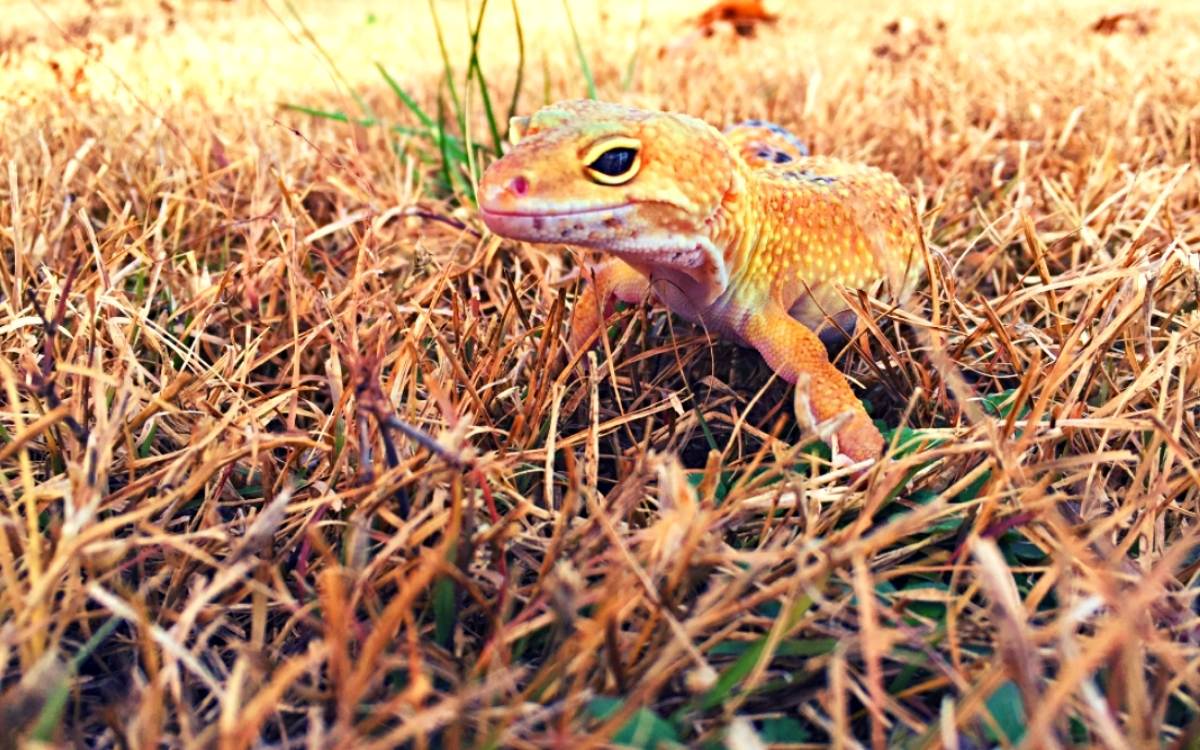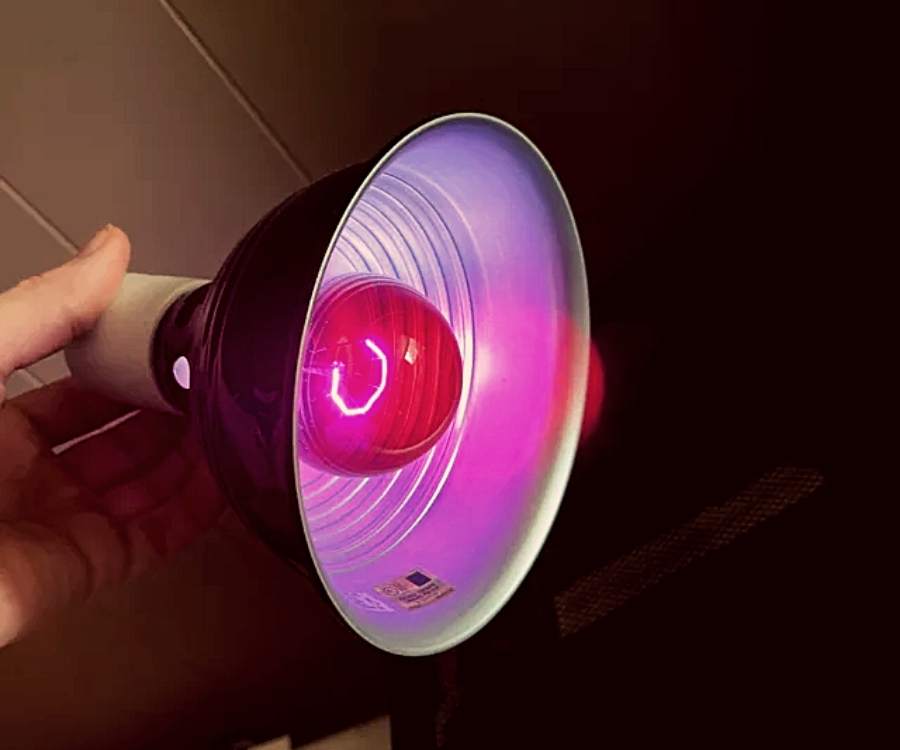Disclaimer: As an Amazon Associate I earn from qualifying purchases. Therefore, we may collect a share of sales from the links on this page, at no extra cost to you!

Are leopard geckos nocturnal?
Many beginners and expert pet reptile owners don’t seem to have a uniform answer. Depending on who you ask, you may hear that leopard geckos are active during twilight hours. Others will tell you these reptiles are full-on nocturnal.
So, if you plan to find out an answer to this question – Are leopard geckos nocturnal? – read this piece through.
Leopard geckos are nocturnal. They like to hide during the daytime and become active at sunset until sunrise. During winter, most leopard geckos in the wild will go into brumation – a period of seasonal hibernation. Most leopard geckos can live on fat reserves for long periods.
Some sources, like this one, believe geckos are crepuscular, that is, they are active during twilight hours.
But extensive research has proven quite the opposite. Leopard geckos begin their activity from twilight hours and remain in full swing till dawn.
Leopard geckos spend most of their day resting in burrows and curled up in shelters. It could be quite difficult to see leopard geckos that venture into the sun. Coming out in the day isn’t great for them and they could be easy targets for predators.
Jump to..
The Leopard Gecko
Bred as captive reptiles for over three decades in America, leopard geckos are native to India, Afghanistan, Pakistan, and Iran. These reptiles prefer rocky, arid regions and survive in desert areas. The leopard gecko is a popular pet for beginners keen to keep domesticated reptiles.
Are Leopard Geckos Crepuscular?
Several articles claim leopard geckos are crepuscular. But with a close look at how these reptiles become active, you’re less likely to believe they’re not nocturnal.
Leopard geckos sleep for several hours when it’s daytime. Most common leopard geckos won’t come out of their burrows until the sun goes down.
In some cases, you may not find a leopard gecko out of its hiding place if it’s not dark. These reptiles are active throughout the night and remain in open spaces until it’s almost dawn.
However, crepuscular species tend to exit their burrows right from dusk. Some of these reptile species could remain active until the wee hours of daytime. Many species of common leopard geckos adopt a nocturnal pattern as opposed to being crepuscular.
Tagging leopard geckos as mostly nocturnal than crepuscular is a fitting description.
Leopard Geckos in the Wild

Wild leopard geckos prefer desert temperatures during dawn and dusk hours. Many wild geckos remain active throughout the desert night, even if there tends to be a decline in temperatures. In twilight hours, these nocturnal reptiles keep to their shelters, especially during the colder months.
During wintertime, it could be less likely for anyone to spot wild leopard geckos freely roaming the wild. These reptiles adopt a semi-hibernation practice that keeps them alive through extreme cold. During this time, most leopard geckos will live off fat reserves until temperatures get warmer.
Leopard geckos hunt during the twilight hours and could remain in search of food well into nighttime. Common leopard geckos can eat baby mice and also cannibalize on their young. Many wild leopard geckos, particularly the poorly-fed ones, turn to their young when the going gets tough.
Also, these reptiles are common prey to nocturnal animals and have several defense mechanisms. Among the defense mechanisms of leopard geckos are:
- Enhanced hearing and sight
- Skin camouflage
- Improved sense of taste and smell
- Burrowing
- Tail detachment (autotomy)
Some of the most common predators of leopard geckos are foxes, snakes, and bigger reptiles. When a leopard gecko loses its tail, it can fully regenerate its missing tail over time.
Domestic Leopard Geckos

Most domestic leopard geckos are in the US. These geckos will be most active than wild species. Some changes in their natural habitat, diet, and grooming could affect their time of activity.
Owners of pet leopard geckos should consider planning their feeding schedule right. There’s no rule as to when’s a great time to feed your gecko. But anytime within the evening and early morning could be great. Most leopard geckos feed on:
- Crickets
- Mealworms
- Waxworms
You need to gut-load insects you plan to feed to your gecko or give the insects a nutritional meal. Also, consider coating the gecko feed with vitamin and calcium supplements before feeding time.
FAQs

Are leopard geckos more active at night?
Leopard geckos are mostly nocturnal than crepuscular. It’s common for some leopard geckos to skip dusk-time activity but exit their hiding spaces at night.
Read More: Can Leopard Geckos See Color
Are all leopard geckos nocturnal?
Common leopard geckos are nocturnal and rarely come out during the daytime. Leopard geckos are mostly nocturnal and appear to be active when it’s nighttime.
Should I turn my leopard geckos light off at night?
Leopard gecko lights should be on during the daytime and off when it’s nighttime. Consider buying a leopard gecko light that helps you copy sunset and sunrise. Altering the lighting profile geckos are used to may not be a great idea.
This is the light we use to help our leopard gecko differentiate between night and day:
Can I take my leopard gecko out during the day?
You can take your leopard gecko out when it’s daytime. But exposing your leopard gecko to excessive sunlight may not be great since they like to be active at night.
Final Thoughts: Are Leopard Geckos Nocturnal?
Since leopard geckos are mostly active during the night, these reptiles are perfect fits for busy pet owners. Your gecko could be active through nighttime and you won’t have to worry about them during the day.
Feeding your gecko is also much easier since they’re less likely to bother you during the day. Consider feeding your leopard gecko in the early evening or morning hours.
Leopard geckos have a relatively long life span and are favorites for pet reptile owners. You can easily get a leopard gecko from breeders for a fair price (usually under $50). Make sure you cater to the needs of your new reptile. You don’t want it getting ill or dying on you all of a sudden.
